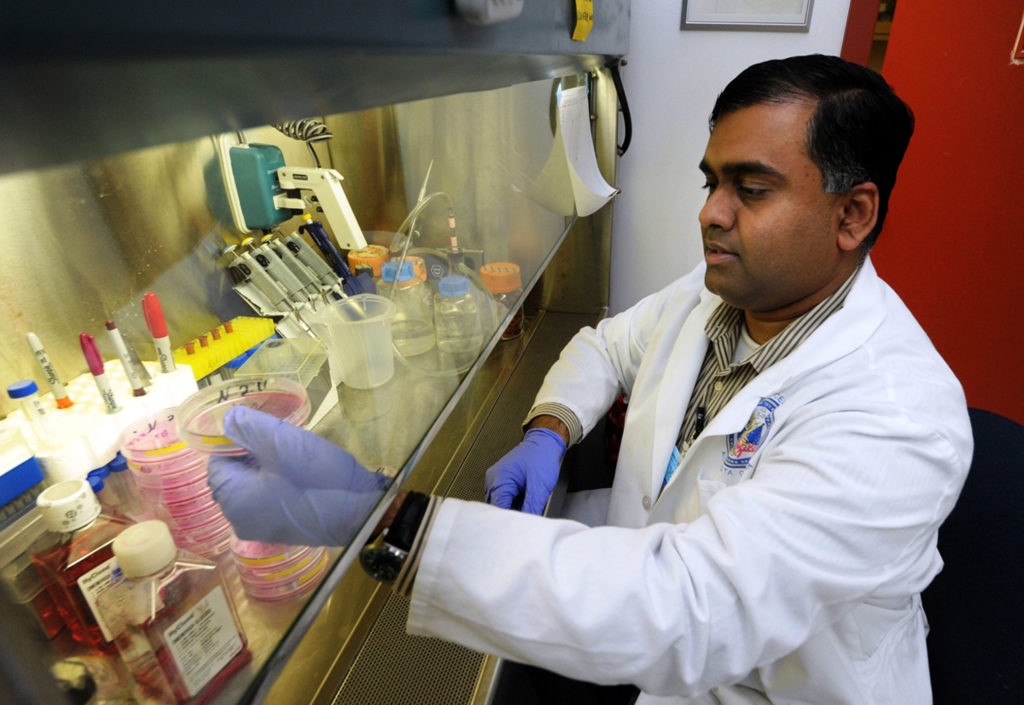Athens, Ga. – Prostate cancer cells need certain enzymes to grow tumors, and an often overlooked enzyme-Pak1-is key for their growth, according to new research from the University of Georgia.
The study, published Feb. 1 in the Journal of Biological Chemistry, was the first to show the importance of Pak1, the p21 activated kinase-1, in prostate cancer and reveal its therapeutic potential for the prevention of prostate tumor growth and spread of cancer cells from the prostate to the blood stream.
“Many people thought Pak1 is not important for prostate physiology and pathology because its expression in the prostate is very little,” said the study’s lead author Somanath Shenoy, an assistant professor in the UGA College of Pharmacy. “Our studies identified that Pak1 expression goes up as the prostate cancer progresses and is very high in advanced, or metastatic, prostate cancer.”
Prostate cancer is the most common cancer among men. According to the Centers for Disease Control and Prevention, 206,640 men were diagnosed with prostate cancer in the U.S. in 2009; 28,088 died from it.
Using biochemical, molecular biology and pharmacological approaches, Shenoy’s research team showed that Pak1 is essential not only for prostate tumor growth but also for cancer cells to break into the blood stream-by breaking the endothelial-barrier- and further metastasis to distant tissues such as bone.
Six different forms of Pak proteins have been identified in mammals. These Pak enzymes transfer phosphate groups from donor molecules to other proteins leading to activation of various cellular signaling pathways. Of the six Pak cells known as targets for binding proteins in a wide range of biological activities, Pak1 is the most studied. Not all Pak proteins are found in all tissues: In the prostate Pak4 and Pak6 are more common than Pak1.
Highly invasive prostate cancer cells express significantly higher levels of Pak1 protein compared to non-invasive prostate cancer cells, Shenoy said. Prostate tumor tissues and prostate cancer metastasized to the lungs showed higher expression of Pak1 compared to normal tissues. And Pak6 protein expression levels did not change with the invasive/metastatic potential of the cancer cells or tumors. Elevated Pak1 levels in hormone-insensitive prostate cancer cells enhanced their invasive potential.
“Our observations suggest that although some level of functional redundancy exists between Pak1 and Pak6 in prostate cancer cells, targeting Pak1 is a potential option for the management of prostate tumor growth, microinvasion and metastasis,” he said.
“We are currently validating the effectiveness if a Pak1 inhibitor compound for prostate cancer therapy in a mouse model. If proven successful, this compound may be used in clinical trials for the prevention and cure of prostate cancer in the coming years.”
Study co-authors are Anna Goc, a postdoctoral associate in Shenoy’s lab and graduate students Ahmad Al-Azayzih, Maha Abdalla and Belal Al-Husein. Research was done in collaboration with physicians at the Georgia Regents University and Charlie Norwood VA Medical Center in Augusta.
The journal article is available at www.ncbi.nlm.nih.gov/pubmed/23258534.
